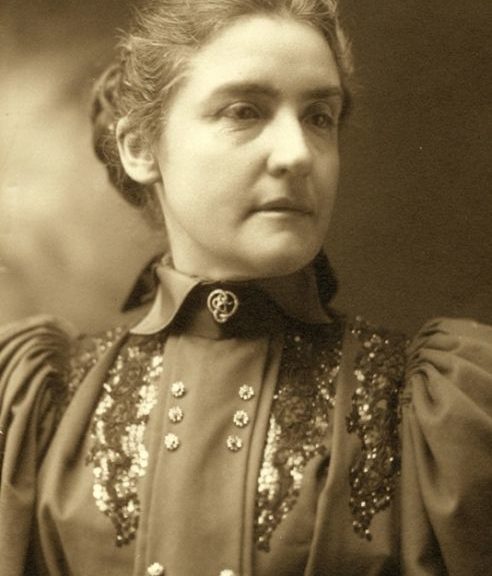CAREY THOMAS, American educator, born (d: 1935); One of the most prominent American educators of the early 20th century, M. Carey Thomas shared her home with another woman while serving as the second president of the women-only Bryn Mawr College in Pennsylvania. Martha Carey Thomas was the eldest of ten children of a Quaker couple in Baltimore, Maryland. Her mother was active in the Women’s Christian Temperance Union and her physician father became a trustee of Johns Hopkins University.
Few Victorian women pursued advanced education or careers, but, encouraged by her family to view herself as the equal of any man, Thomas did so. After obtaining a B.A. in classics from Cornell University in 1875, she tried to obtain a graduate degree from Johns Hopkins University. The school would not permit Thomas to attend classes with men, and she withdrew in frustration.
Leaving the United States for Europe, Thomas studied in Leipzig, Germany. When professors at Leipzig refused to examine a woman for the doctorate degree, she transferred to the University of Zurich in Switzerland. In 1882, she became the first woman and the first foreigner to obtain that school’s doctorate summa cum laude.
Appointed to a post at newly established Bryn Mawr in Pennsylvania in 1883, Thomas became the first dean of an American women’s college to hold a doctorate. Named president in 1894, she boosted the scholarly reputation of the school by seeking only the ablest scholars for the faculty, recruiting Woodrow Wilson among others. She encouraged non-traditional attitudes among the undergraduates and strongly supported academic and professional careers for women, famously stating “our failures only marry.”
Education of a Woman, published in 1900, established Thomas’s international reputation as the leading authority on the higher education of women. Recognizing the importance of women’s roles in Progressive-era social reform, Thomas also found time to contribute to the establishment of the Johns Hopkins University School of Medicine and the Bryn Mawr Summer School for Women Workers.
While in Europe, Thomas had lived with Mamie Gwinn, a childhood friend with whom she enjoyed a “romantic friendship.” This arrangement continued at Bryn Mawr, where Gwinn also taught. The two women openly shared a home on the college campus until Gwinn married in 1904. (Gertrude Stein immortalized the messy break-up in her story Fernhurst, probably written in late 1904.)
While involved with Gwinn, Thomas had pursued a relationship with Mary Garrett (1839-1915), a philanthropist and heiress to the Baltimore and Ohio Railroad fortune. Deeply committed to women’s rights, in 1893 Garrett made a sizable gift in support of the Johns Hopkins University Medical School, on condition that the new school admit women on an equal basis. Her philanthropy also benefited the women’s suffrage movement.
After Gwinn and Thomas separated, Garrett and Thomas became a couple, living together at the college until Garrett’s death. Garrett bequeathed the bulk of her estate to Thomas. Thomas retired in 1922 and succumbed to heart failure on December 2, 1935.
Thomas never publicly discussed her sexuality, but there is a strong presumption that she was a Lesbian. After analyzing Thomas’s reading, her biographer Helen Lefkowitz Horowitz argued that the Bryn Mawr president was well aware of the possibilities for physical love between women and of the medically oriented literature on sexuality that began to appear in the late nineteenth century.
Thomas is notable for managing to carve out a large role for women in the world of academia. While her sexual orientation cannot be proved beyond doubt, her pioneering educational achievements established the groundwork that made it possible for generations of other women to pursue lives free from financial and emotional dependence upon men.
